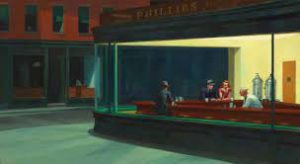 This short story, based on Edward Hopper’s most famous work by the same name, follows a retired detective now working as a private eye. After tracking a young woman to the museum where the painting Nighthawks is on display, he is accidentally placed into a situation where he must have a conversation with her. She catches him out, and, off the page, tells him about her father, the man who had paid to have her followed. After speaking with her, he decides to tell her father that she wasn’t the right person, and advises her to change states.
This short story, based on Edward Hopper’s most famous work by the same name, follows a retired detective now working as a private eye. After tracking a young woman to the museum where the painting Nighthawks is on display, he is accidentally placed into a situation where he must have a conversation with her. She catches him out, and, off the page, tells him about her father, the man who had paid to have her followed. After speaking with her, he decides to tell her father that she wasn’t the right person, and advises her to change states.
What I find interesting about this story is that what happened between the mark and her father is never shared with the reader. There are hints – we know that it happened in Maui and that the father was drunk – but nothing of substance is revealed. This choice makes sense, because the specifics of what happened are not the subject of the story. This is a story about a man who is always alone encountering someone like him and finding some kinship with her. She asks him which of the figures in the painting he is, and explains that she is the man sitting alone. He agrees the he is as well. She is a writer who uses paintings to inspire her work, and he relates this to his own experience of a relationship between studying the saxophone and detective work — it’s unexplainable, but there is a way that inspiration travels through a person to different disciplines. He is not only sympathetic to her situation (perhaps in part because he has daughters of his own), but he experiences a profound connection to her for her appreciation of the painting. I believe that her analysis of the work also gives him some further insight into his own situation, inspiring him to consider things in a way that he never had before.
I think the part that you mentioned about the writer not actually saying what happened between the father and the daughter was a brilliant choice as well. Not only did it shift out focus to something else other than that event, but it also made me think why did they choose to do that? In my mind, I think they wrote it like that so your mind would go to something personal that hurt the reader themselves, therefore making it a more powerful event. In that same thought, how you mentioned not telling the reader deliberately also made it more personal for the detective. I love it!